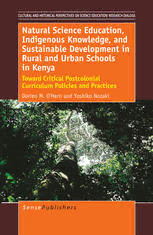
Natural Science Education, Indigenous Knowledge, and Sustainable Development in Rural and Urban Schools in Kenya: Toward Critical Postcolonial Curriculum Policies and Practices PDF
Preview Natural Science Education, Indigenous Knowledge, and Sustainable Development in Rural and Urban Schools in Kenya: Toward Critical Postcolonial Curriculum Policies and Practices
Natural Science Education, Indigenous Knowledge, and Sustainable Development in Rural and Urban Schools in Kenya Cultural and Historical Perspectives on Science Education: Research Dialogs Volume 6 Series editors Kenneth Tobin The Graduate Center, City University of New York, USA Catherine Milne Steinhardt School of Culture, Education, and Human Development, New York University Research dialogs consists of books written for undergraduate and graduate students of science education, teachers, parents, policy makers, and the public at large. Research dialogs bridge theory, research, and the practice of science education. Books in the series focus on what we know about key topics in science education – including, teaching, connecting the learning of science to the culture of students, emotions and the learning of science, labs, field trips, involving parents, science and everyday life, scientific literacy, including the latest technologies to facilitate science learning, expanding the roles of students, after school programs, museums and science, doing dissections, etc. Natural Science Education, Indigenous Knowledge, and Sustainable Development in Rural and Urban Schools in Kenya Toward Critical Postcolonial Curriculum Policies and Practices Darren M. O’Hern The Council for International Culture and Education, NY, USA and Yoshiko Nozaki Waseda University, Tokyo, JAPAN A C.I.P. record for this book is available from the Library of Congress. ISBN: 978-94-6209-540-3 (paperback) ISBN: 978-94-6209-541-0 (hardback) ISBN: 978-94-6209-542-7 (e-book) Published by: Sense Publishers, P.O. Box 21858, 3001 AW Rotterdam, The Netherlands https://www.sensepublishers.com/ Printed on acid-free paper All Rights Reserved © 2014 Sense Publishers No part of this work may be reproduced, stored in a retrieval system, or transmitted in any form or by any means, electronic, mechanical, photocopying, microfilming, recording or otherwise, without written permission from the Publisher, with the exception of any material supplied specifically for the purpose of being entered and executed on a computer system, for exclusive use by the purchaser of the work. For Jessica, Lindsey, Maya, Corryn, and Elsie For Kazumi and Takeji Nozaki TABLE OF CONTENTS Foreword to Natural Science Education, Indigenous Knowledge, and Sustainable Development in Rural and Urban Schools in Kenya ix Acknowledgements xiii 1. Introduction: Sustainability, Development, and Natural Science Education 1 2. Natural Science Education in Non-Western Nations and Critical and Postcolonial Perspectives: A Literature Review 13 3. Methods and Methodology: Multi-Sited Ethnographic Study 33 4. Kenyan Education: The State, Schools, and Legacy of Colonialism 47 5. Forest Secondary School: Schooling, Inequality, and Naural Science Education in Rural Kenya 63 6. Central Boys Secondary School: National Curriculum and Natural Science Education in Urban Kenya 87 7. Uhuru Girls Secondary School: Gender, Natural Science Knowledge, and Education for Sustainable Development 109 8. Discussion and Concluding Thoughts: A Call for Critical Postcolonial Approaches to Educational Policy, Curriculum, and Pedagogy 133 Appendix A 149 Appendix B 151 Appendix C 152 References 153 vii FOREWORD TO NATURAL SCIENCE EDUCATION, INDIGENOUS KNOWLEDGE, AND SUSTAINABLE DEVELOPMENT IN RURAL AND URBAN SCHOOLS IN KENYA A side from the very evident economic and political crises that we are facing in education, we are also in the midst of what can only be called an epistemological crisis. With the rise of audit cultures (Apple, 2006; Leys, 2003), schools, teachers, and students are seen as “good” along only one measure—test scores. A good teacher is one who produces ever increasing average student test scores. A good student is one who does the same. And entire school systems are to be judged by comparative scores on the PISA ratings. Evidence is of course needed in judging education. But in the rush to install such regimes of accountability, too little thought is given to whether the knowledge that is supposedly measured by such tests is itself what students, communities, and nations actually need. What can be measured too often replaces what should be taught. An active critical examination and debate over what knowledge is needed, especially in a time of severe environmental crisis, is either delayed or seen as unnecessary or too costly. So too is the question of where such knowledge might come from. This is where Natural Science Education, Indigenous Knowledge, and Sustainable Development in Rural and Urban Schools in Kenya: Towards Critical Postcolonial Approaches to Educational Policy and Practice enters. Let me situate this volume in the larger context of critical educational theory and practice. In Can Education Change Society? (Apple, 2013), I detail nine tasks of the critical scholar/activist in education. Among them were the following three tasks: 1. Bearing witness to negativity. That is, one should engage in describing what is actually happening in education that reproduces relations that do not support a more equal and sustainable society. 2 Illuminate the spaces of possible counter-hegemonic educational work. That is, point out the spaces and resources that already exist where a more critically democratic education can go on. 3. Act as a critical secretary. That is, critically describe the educational actions, the curricular knowledge, the teaching, and the people who are actually engaged in filling these spaces so that our efforts do not simply have the effect of increasing both cynicism and the feeling that “nothing can be done.” Darren M. O’Hern and Yoshiko Nozaki’s insightful book engages in all three of these tasks. The aims of the volume are clear in the following quotation from their introductory chapter: [W]hat kind of knowledge, or whose knowledge, is currently considered legitimate to be taught in natural science education in Kenya? How is such ix
